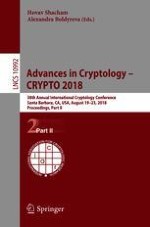2018 | OriginalPaper | Chapter
On the Exact Round Complexity of Secure Three-Party Computation
Authors : Arpita Patra, Divya Ravi
Published in: Advances in Cryptology – CRYPTO 2018
Publisher: Springer International Publishing
Activate our intelligent search to find suitable subject content or patents.
Select sections of text to find matching patents with Artificial Intelligence. powered by
Select sections of text to find additional relevant content using AI-assisted search. powered by
